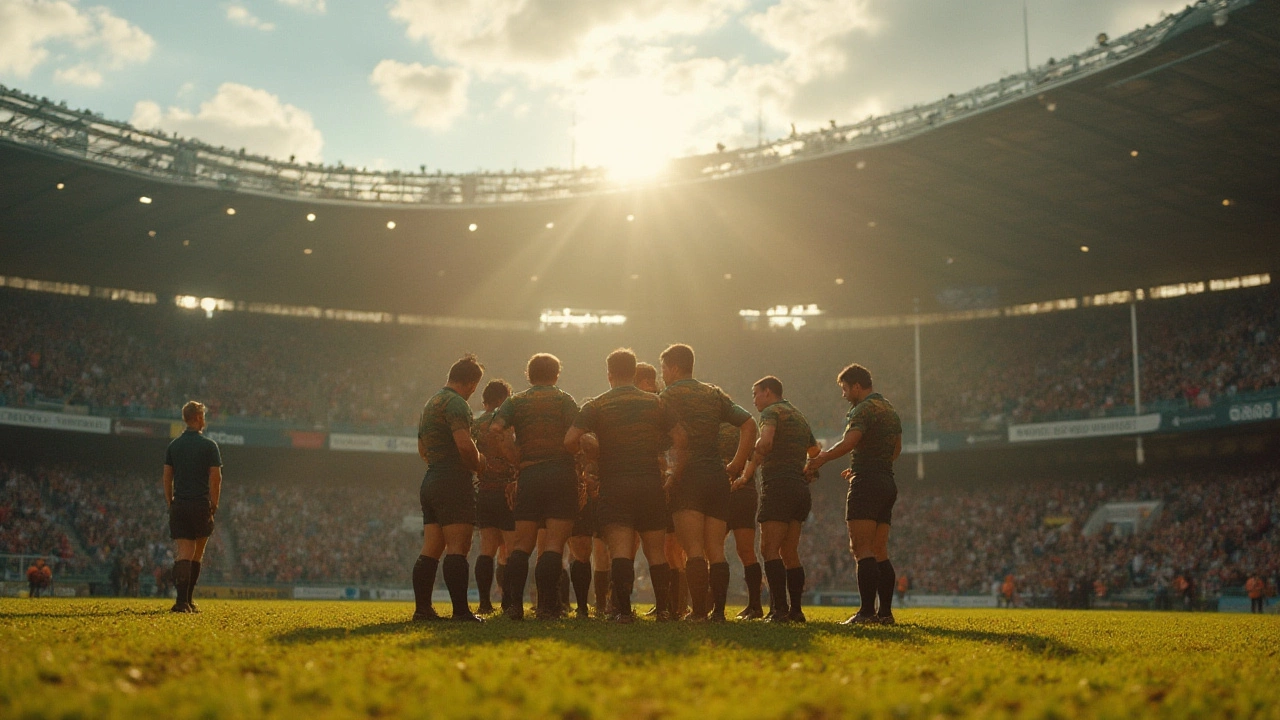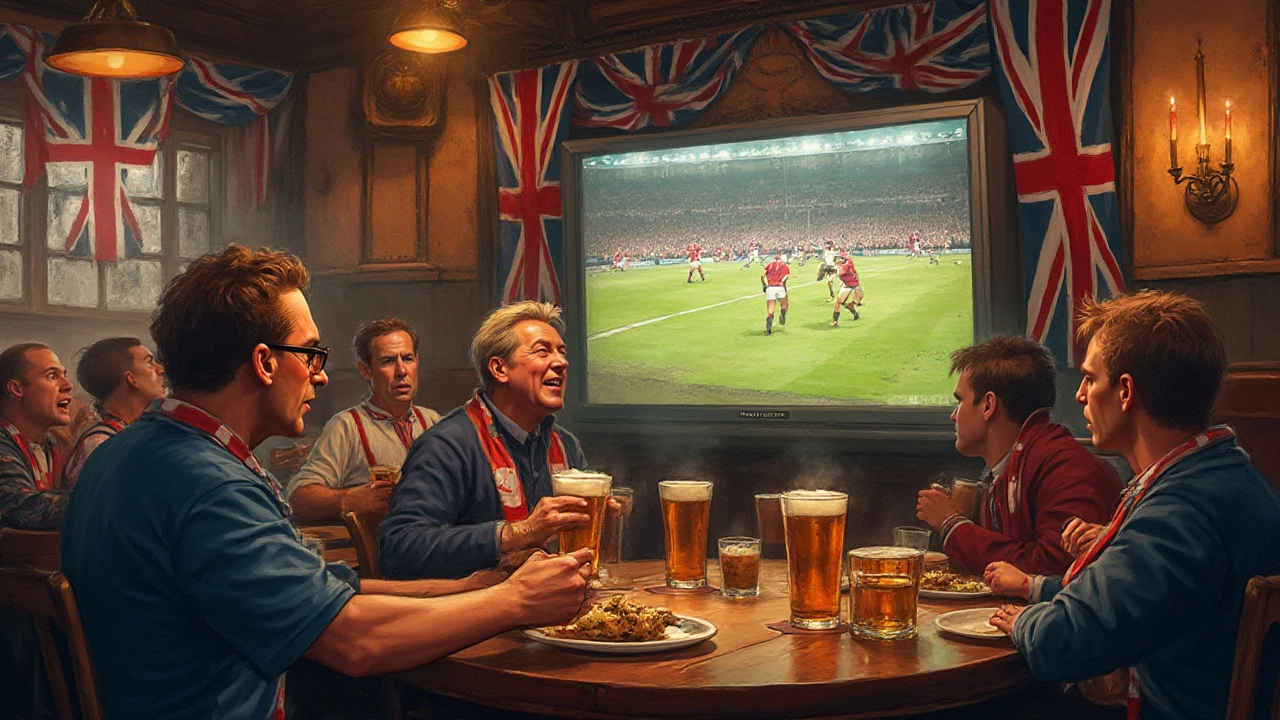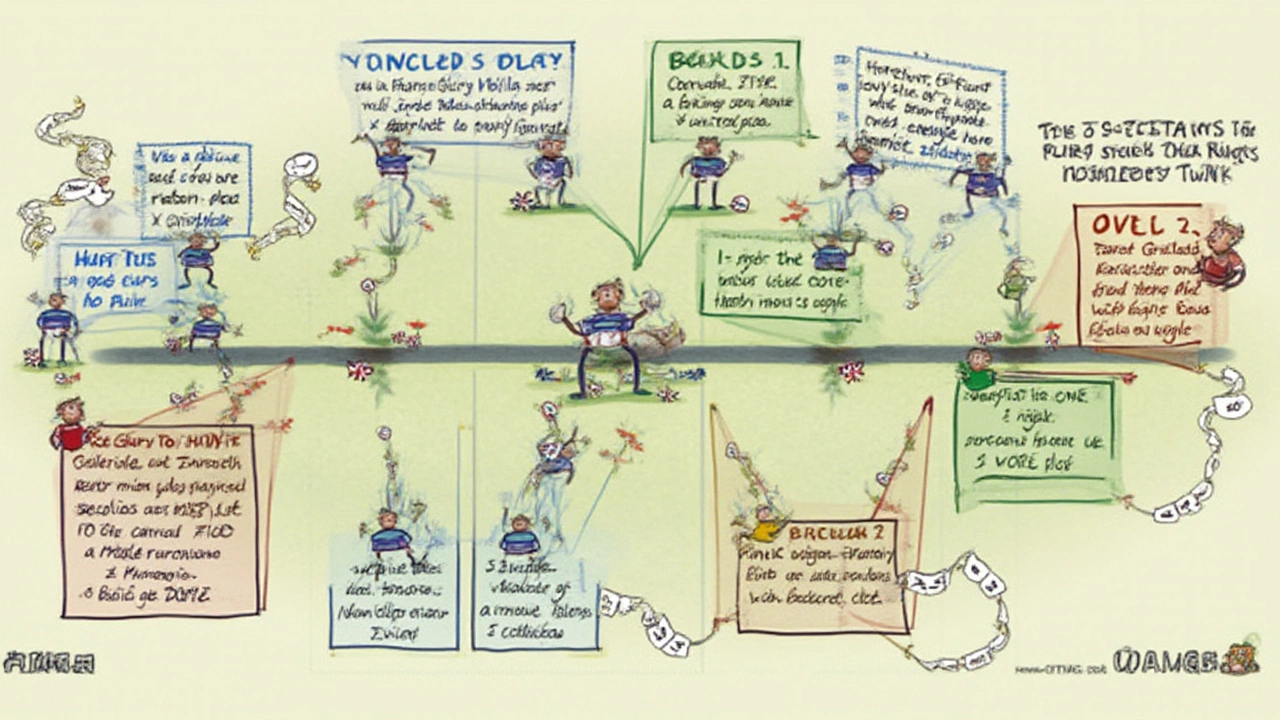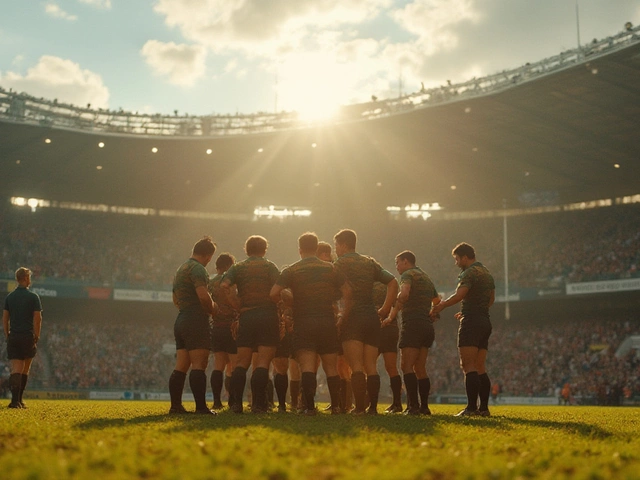
Rugby Fixtures July 27, 2025
How Long Does Rugby Last? Full Guide to Rugby Match Duration, Overtime, and Rules
Most people go into their first rugby match thinking it'll wrap up within an hour and a half – and then, somehow, they're still standing on the sideline twenty minutes later than planned. Time can feel slippery in this sport. It’s not just about the clock ticking down; there’s a whole ritual around the halves, injury pauses, unpredictable overtime, and a mindset that time should never kill the excitement. The simple question—how long does rugby last?—has a few twists.
Standard Duration of a Rugby Match
So, let’s get right to it: a standard rugby match consists of two halves, each lasting 40 minutes of playing time for adults. Sounds straightforward, right? But that’s only true if you ignore stoppages, injuries, substitutions, video referee decisions, time-wasting tactics (yes, that happens), and the referee’s famous ‘time off’ calls. Between the halves, there’s a halftime break—generally around 10 minutes, though occasionally it drifts a minute or two longer depending on the competition rules or if someone managed to spill drinks on the pitch (trust me, I’ve seen it happen).
Unlike football (soccer), where the clock keeps rolling, rugby is all about fairness: the referee has the power to stop time for injuries, TMO reviews, or downright chaotic scrums that seem to last forever. When Ewan played his first under-14s match, I’ll never forget the confusion on the parents’ faces when the clock froze for the third time, and some thought the stadium clock was broken. Officially, the match duration is 80 minutes plus halftime. But in reality, with stops and starts, the games frequently stretch to 90 minutes—or more for the big events with TV coverage and drama.
If you’re watching a younger age group, expect different timings: youth rugby matches can be as brief as 40 to 60 minutes, split into shorter halves, mostly to prevent exhaustion and keep it fun. Sevens matches, which have become massive events around the world, are even shorter—seven-minute halves, usually wrapped up inside 20 minutes with a halftime that barely gives the players time to catch their breath. A quick cheat sheet below helps sum up most common durations:
| Rugby Type | Half Length (mins) | Total Play Time | Typical Real Duration |
|---|---|---|---|
| Traditional (Union) | 40 | 80 + 10 (halftime) | 90-100 mins |
| Sevens | 7 | 14 + 2 (halftime) | 18-20 mins |
| Youth (Under 14) | 20 | 40 + 10 (halftime) | 50-60 mins |
And here’s a fun fact: the 2019 Rugby World Cup Final between England and South Africa officially clocked 80 minutes, but the event ran well over two hours if you include presentations and celebrations. Rugby isn’t a sport that fits neatly into your calendar app—plan for a bit of flexibility.
What Makes Rugby Clocks Unique?
One thing that sets rugby apart is its approach to the game clock. When play needs to be stopped for an injury, foul, or any other disruption, the referee simply says “time off” and the official clock freezes. This kind of transparency makes sure there’s no advantage gained by faking leg cramps in the final moments, and fans love knowing that every second on the field really counts.
If you ever check out a live match, you’ll quickly notice not every stadium has fancy digital clocks linked to the referee’s watch. Sometimes, only the match official truly knows the real time left, and everyone else is left to guess. This keeps teams honest—no running the clock down in the corner like in football. Instead, if play gets stopped with two minutes left, those two minutes will be played once action resumes. That’s why so many matches have thrilling, frantic finishes; you can’t just sit on a lead and hope the clock saves you.
There’s also the ‘dead ball’ time—when the ball is out of play, like after a try, penalty, or lineout. Some competitions, to keep games moving, now limit how long teams have to set up for set pieces. The Rugby World Cup, for example, allows 90 seconds for a conversion kick after a try and 60 seconds for penalties. Get those boots laced and lungs filled—there’s no time to dawdle.
Have you ever noticed rugby referees gesturing dramatically when resetting plays? That’s to clue the timekeepers in on when to stop and start the clock. In fact, lots of top referees wear GPS-tracked watches connected to stadium timekeepers to make things absolutely accurate. Guesswork has no place in the how long does rugby last debate at the professional level.

Extra Time, Sudden Death, and Draw Breakers
If you think it’s all over when 80 minutes is up, think again. In knockout tournaments or playoffs when a winner is needed, tied games go into extra time. Usually, this means two extra periods—10 minutes each way in most major competitions. If the score stays level, some tournaments head into sudden death, also called “golden point”—the next team to score wins. When my son’s school team made it to the finals and entered sudden death, the entire sideline was a ball of nerves, knowing a single penalty or drop goal could decide weeks of hard work.
Some competitions also have “kick-offs” to settle it if nothing else works—a bit like penalty shoot-outs in football. Each team lines up and sends five players to take a kick at goal from set spots. As you’d expect, the pressure gets intense, and nerves fray. This only happens in the rarest cases, mostly in tournament finals, because normally someone cracks during sudden death.
There’s always unpredictability about how long extra time will actually last. Add on time for injuries or deliberations, and you could be in for a marathon finish. In shorter rugby forms like sevens, extra time looks different. If it’s knockout and still tied after normal time, they play sudden death right away, with no long periods. Once, at the Hong Kong Sevens, a match was decided in the first minute of sudden death—blink, and you miss it!
Here’s a handy breakdown of tiebreak scenarios in major rugby:
| Scenario | Duration |
|---|---|
| Standard Extra Time (Union) | 2 x 10 mins |
| Sudden Death | Ends on next score |
| Kick-off (Shoot-out) | 5 kicks per team, then sudden death |
| Sevens Sudden Death | First team to score |
So next time you promise your family you’ll be home "as soon as the game finishes," maybe set realistic expectations. When tournament glory’s on the line, nobody rushes off the field quickly.
Big Matches, TV Coverage, and Delays
The higher the stakes, the less rigid the clock becomes. For massive games—think World Cups, Six Nations clashes, or Super Rugby—everything’s stretched a bit by TV coverage needs. Picture this: crowd shots, pre-game anthems, coin tosses, and even ceremonial parades can all add minutes. A live TV broadcaster can even nudge the start five minutes later if another match is running late.
One memorable example: the 2015 Rugby World Cup Final was scheduled for 5pm London time, but didn’t actually kick off until 5:10 after a BBC commentator kept a mic running longer than planned. All that anticipation, and then a little extra waiting just added to the tension. It’s the price we pay for the spectacle.
Those stoppages for injuries or red-card reviews? These days, TV match officials check footage in slow motion and communicate with the on-pitch referee via headsets. Every second spent watching these replays is time off—but the crowd rarely knows exactly how long it’ll take. Sometimes a scrum collapses three times in a row, and the events on screen outlast the scheduled half. That’s rugby: the only sport where “a minute” might mean “we’ll get to it when we’re ready.”
Rain delays or lightning? Matches can pause for 15 or 20 minutes or even get stopped overnight in rare cases. At the 2019 World Cup in Japan, two pool matches were cancelled because of Typhoon Hagibis, making for the shortest “game time” ever—zero minutes but a full result on record. Weather is every rugby timer’s wildcard.
Bottom line: don’t trust the listed match time on your TV guide. If you’re planning a schedule, take the starting whistle time, add at least 30 minutes for stoppages and ceremonies, and keep another 10 for good measure if it’s a big deal. And always keep your snacks close. When Ewan’s favorite team, Leinster, is in a final, I double the snack count—because you just never know when it’ll end.

Tips for Fans: Managing Your Time and Expectations
You’ve got the basics down, but if you’re catching a game live or watching from home, there are a few tips that’ll make the timing less of a gamble. First, if you’ve got somewhere to be after a match, don’t cut it close. Always assume you’ll be there for at least two hours even for a regular club game, and longer for big finals.
Brought the kids? Pack for the long haul—water, snacks, a jacket for when the sun suddenly disappears, and some patience. When I take Ewan to a game, the wait for a scrum to reset or a video review is a good time for a bathroom break—just make sure you don’t dash off during a lineout, or you’ll miss half the action.
If you’re new to rugby, track how the officials manage the clock. Watching for that gesture—the referee tapping their wrist or calling "time off"—can quickly make you an expert on when there’s still real play to come. And remember, it’s not like basketball or American football where you can burn timeouts to stop the clock strategically. Play resumes quickly, so stay alert.
One last thing: enjoy the unpredictability. Unlike most sports, rugby's unique clock and stoppage rules add to the thrill—not just for players, but for everyone watching. Sometimes the final whistle catches you by surprise; sometimes it feels like the longest wait of your life. Rugby promises that if something matters, the clock will wait for it—no matter how long it takes.




